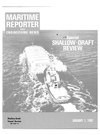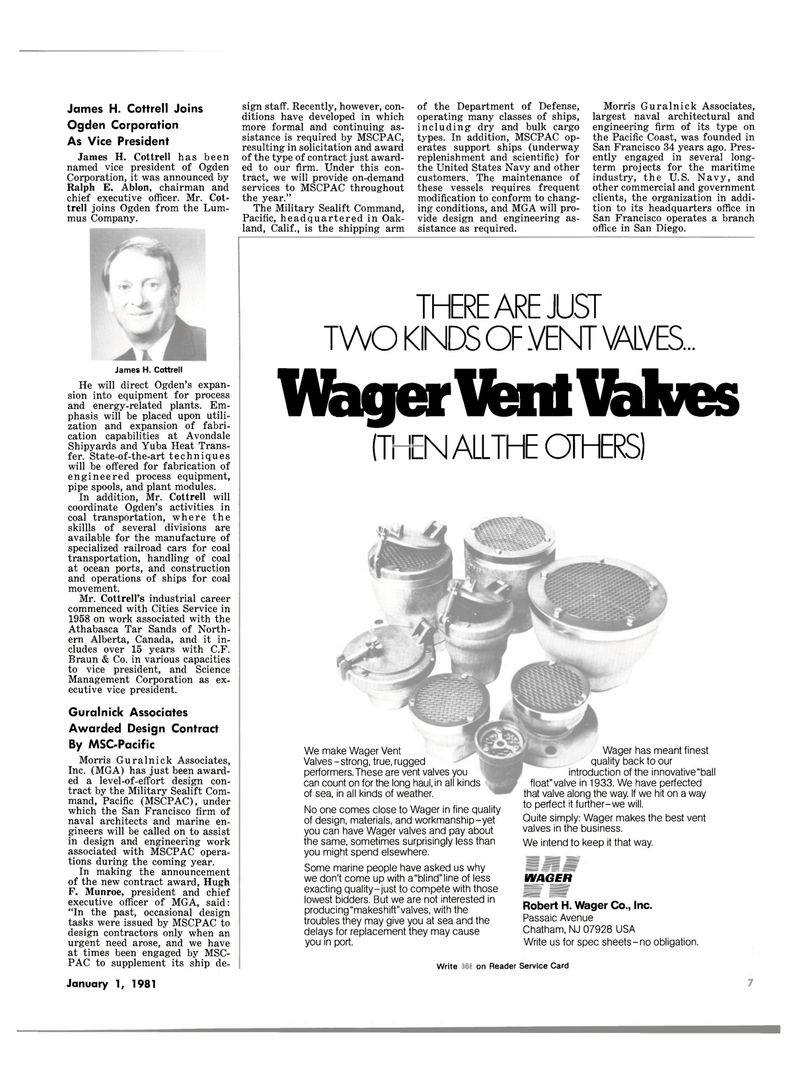
Page 5: of Maritime Reporter Magazine (January 1981)
Read this page in Pdf, Flash or Html5 edition of January 1981 Maritime Reporter Magazine
James H. Cottrell Joins
Ogden Corporation
As Vice President
James H. Cottrell has been named vice president of Ogden
Corporation, it was announced by
Ralph E. Ablon, chairman and chief executive officer. Mr. Cot- trell joins Ogden from the Lum- mus Company.
James H. Cottrell
He will direct Ogden's expan- sion into equipment for process and energy-related plants. Em- phasis will be placed upon utili- zation and expansion of fabri- cation capabilities at Avondale
Shipyards and Yuba Heat Trans- fer. State-of-the-art techniques will be offered for fabrication of engineered process equipment, pipe spools, and plant modules.
In addition, Mr. Cottrell will coordinate Ogden's activities in coal transportation, where the skillls of several divisions are available for the manufacture of specialized railroad cars for coal transportation, handling of coal at ocean ports, and construction and operations of ships for coal movement.
Mr. Cottrell's industrial career commenced with Cities Service in 1958 on work associated with the
Athabasca Tar Sands of North- ern Alberta, Canada, and it in- cludes over 15 years with C.F.
Braun & Co. in various capacities to vice president, and Science
Management Corporation as ex- ecutive vice president.
Guralnick Associates
Awarded Design Contract
By MSC-Pacific
Morris Guralnick Associates,
Inc. (MGA) has just been award- ed a level-of-effort design con- tract by the Military Sealift Com- mand, Pacific (MSCPAC), under which the San Francisco firm of naval architects and marine en- gineers will be called on to assist in design and engineering work associated with MSCPAC opera- tions during the coming year.
In making the announcement of the new contract award, Hugh
F. Munroe, president and chief executive officer of MGA, said: "In the past, occasional design tasks were issued by MSCPAC to design contractors only when an urgent need arose, and we have at times been engaged by MSC-
PAC to supplement its ship de- sign staff. Recently, however, con- ditions have developed in which more formal and continuing as- sistance is required by MSCPAC, resulting in solicitation and award of the type of contract just award- ed to our firm. Under this con- tract, we will provide on-demand services to MSCPAC throughout the year."
The Military Sealift Command,
Pacific, headquartered in Oak- land, Calif., is the shipping arm of the Department of Defense, operating many classes of ships, including dry and bulk cargo types. In addition, MSCPAC op- erates support ships (underway replenishment and scientific) for the United States Navy and other customers. The maintenance of these vessels requires frequent modification to conform to chang- ing conditions, and MGA will pro- vide design and engineering as- sistance as required.
Write 257 on Reader Service Card
Morris Guralnick Associates, largest naval architectural and engineering firm of its type on the Pacific Coast, was founded in
San Francisco 34 years ago. Pres- ently engaged in several long- term projects for the maritime industry, the U.S. Navy, and other commercial and government clients, the organization in addi- tion to its headquarters office in
San Francisco operates a branch office in San Diego.
THERE ARE JUST
TWO KINDS OF VENT VALVES...
WagerMVabes (THEN ALLTHE OTHERS)
WAGER
Robert H. Wager Co., Inc.
Passaic Avenue
Chatham, NJ 07928 USA
Write us for spec sheets-no obligation.
Wager has meant finest quality back to our introduction of the innovative"ball float"valve in 1933. We have perfected that valve along the way. If we hit on a way to perfect it further-we will.
Quite simply: Wager makes the best vent valves in the business.
We intend to keep it that way.
We make Wager Vent
Valves-strong, true, rugged performers. These are vent valves you can count on for the long haul, in all kinds of sea, in all kinds of weather.
No one comes close to Wager in fine quality of design, materials, and workmanship-yet you can have Wager valves and pay about the same, sometimes surprisingly less than you might spend elsewhere.
Some marine people have asked us why we don't come up with a"blind"line of less exacting quality-just to compete with those lowest bidders. But we are not interested in producing"makeshift"valves, with the troubles they may give you at sea and the delays for replacement they may cause you in port.
January 1, 1981 7

 4
4

 6
6
